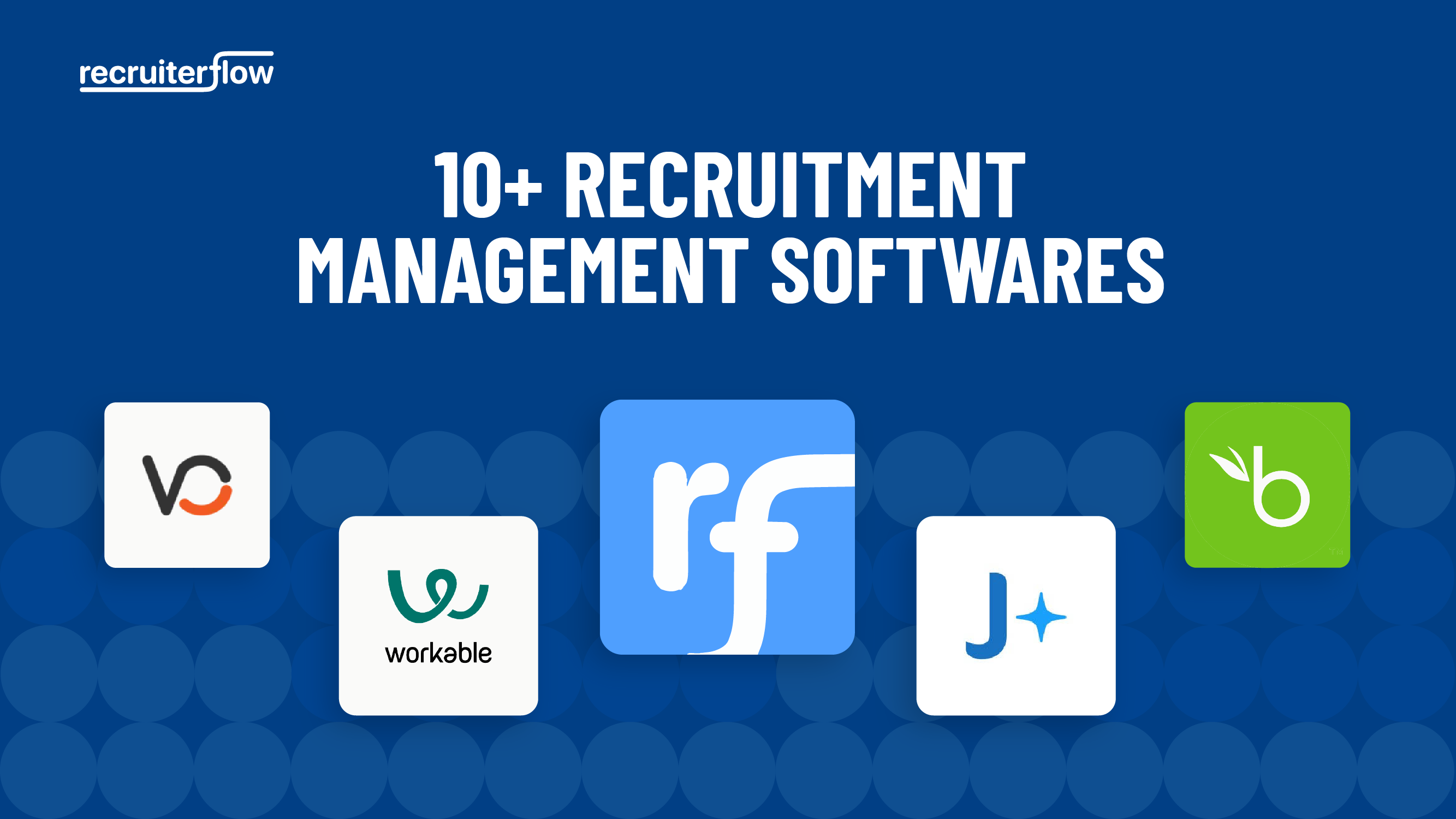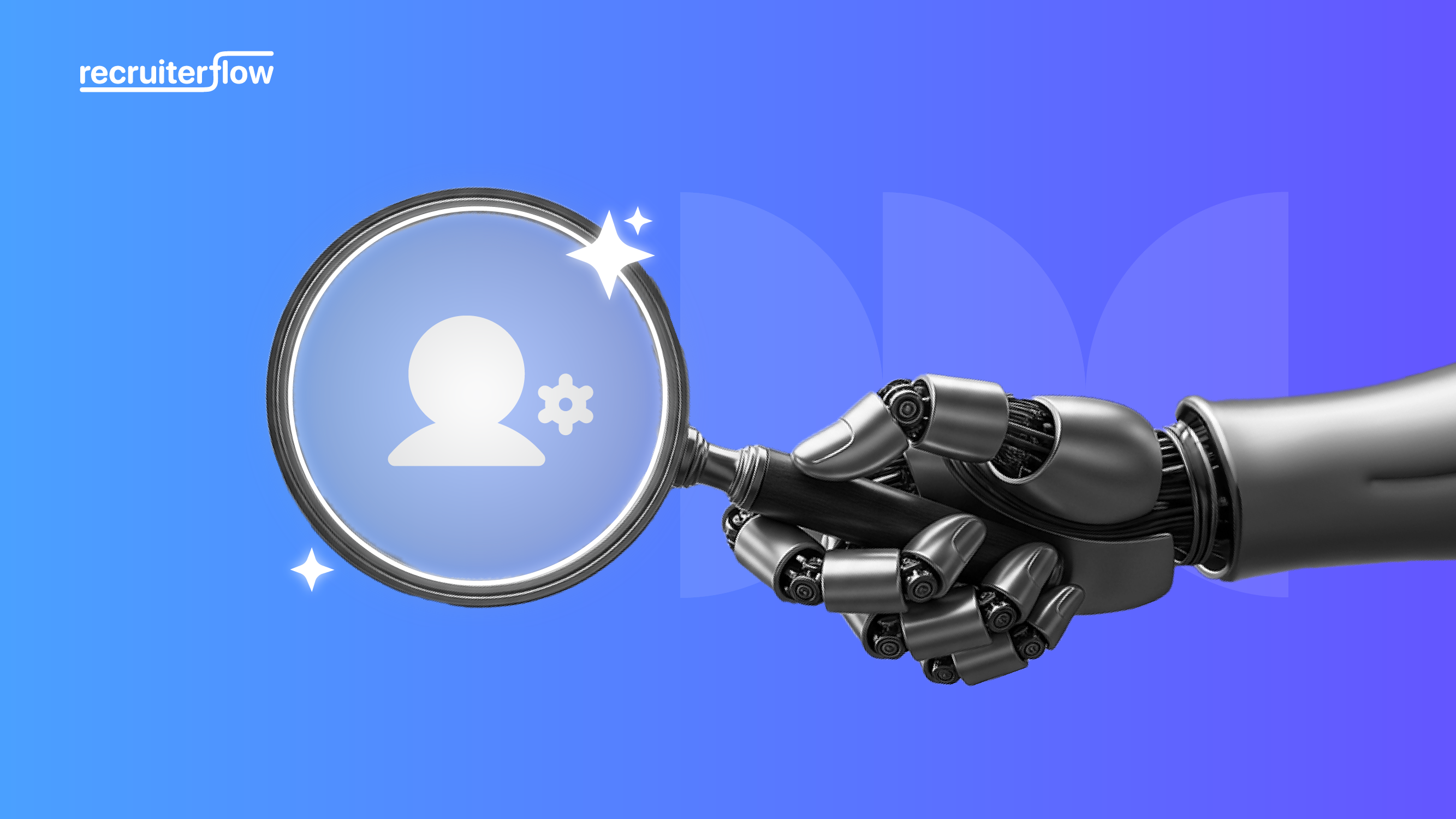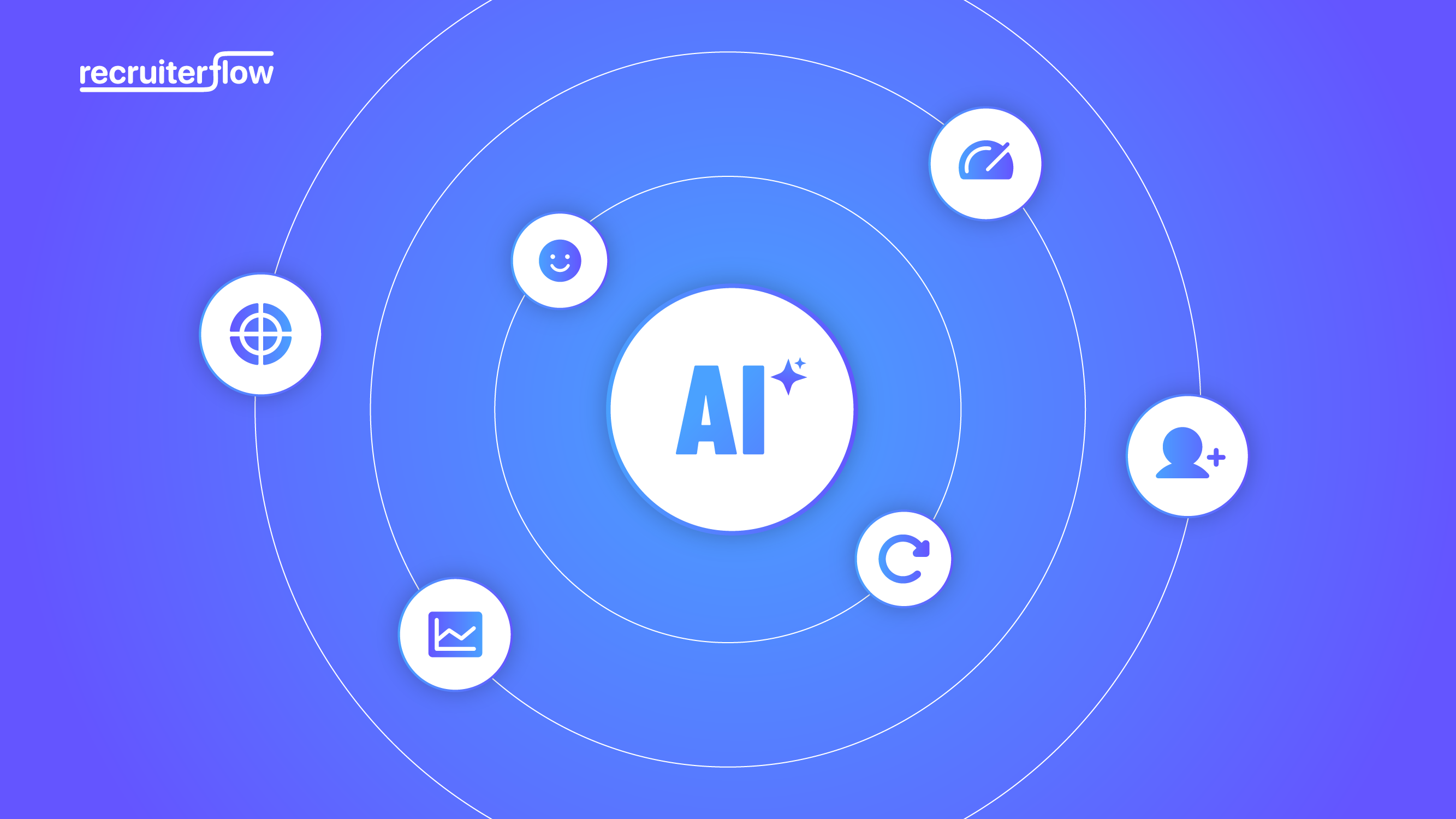
How AI for Executive Search is Transforming Recruitment

Executive searches aren’t just about hiring the right person. It involves solving a core strategic puzzle for a company — and shaping its future. Keyword matching and resume sifting is important, but what truly matters is nuance, intuition, behavioral analysis, depth of network, and strategic insight.
Stakes are high. Recruiters have no margin for error. And within a saturated market where top talent is basically royalty, they need a serious ace up their sleeve.
Enter the ace: AI for executive search.
This article dives into what AI for executive search means, and how firms can use AI to build smarter, faster, and more adaptive workflows with AI. AI can enhance recruiters’ capacity to make smarter decisions and get more done without incurring burnout or compromising quality.
It’s not hype. It’s a transformation, and here’s how.
What Is AI for Executive Search?
AI for executive search advances beyond matching keywords and scraping LinkedIn information. It involves using AI agents that are autonomous and continuously learning from historical datasets.
In essence, these agents act like digital teammates. They are proactive, context-aware, and take autonomous decisions. They can easily take over mundane but essential tasks such as parsing through thousands of candidate interviews, flagging job changes of desirable candidates, generating summaries of calls and interactions, and recommending intelligent next steps.
All this, while also easing your human recruiters’ workload and staving off burnout. By using predictive analytics, natural language processing, and context-based research, AI-driven executive search strategy can blend intelligence with autonomy and do more with much less.
Also read our detailed guide on how executive search firms find candidates.
Key Benefits of AI for Executive Search Firms
AI executive search will not replace your top-billing recruiters, not by a long shot. However, it will give them the tools to gain serious leverage and increase their hiring percentages. Here are the key benefits of AI for executive search firms –
Amplifying Consultant Productivity
AI agents can automatically do the following:
- Monitor candidates and notify recruiters if candidates change jobs.
- Suggest outreach options based on relationship history with specific candidates.
- Keep databases fresh and revenue-ready by automatically updating CRM fields and contact data.
- Create intelligent follow-up emails in a specified tone of voice.
AI agents can take on about 80% of repetitive, non-client-facing tasks, which frees up recruiters to pursue meaningful communication, assist candidates as they move through the pipeline and close hires more efficiently.
Increasing Revenue per Recruiter
By allowing AI to take more off recruiters’ plates, hiring teams can directly enable more placements per recruiter, faster turnaround times, and higher client satisfaction. Staffers spend less time digging and more time influencing candidates to pursue and accept the right role.
Reducing Burnout
Internal research and industry stats show that 61% of recruiters report burnout, and 45% blame it on repetitive admin work. AI agents do away with data entry and repetitive follow-ups, keeping individual recruiters rested, sharp, and alert.
Improving Candidate Engagement
AI systems like Recruiterflow’s Email Generation Agent can personalize outreach at scale, which contributes to higher response and engagement rates. Firms like Hays have reported as high as 41% increase in candidate engagement after implementing AI-based matching and outreach tools.
How to Use AI for Executive Search
Let’s make this clear — AI will not replace the human recruiter.
However, it will certainly become a strategic multiplier that helps staffing agencies scale intelligence and velocity while staying contextually aware and relevant. It speeds up processes without replacing the human elements essential to executive searches — trust, nuance, and communication.
Here’s how to deploy AI strategically as silent partners, on duty 24/7, to derive sharper insights and higher productivity in executive search.
Strategic Research & Market Mapping
Instead of consultants spending hours looking for the right candidates, analyzing org structures, and benchmarking compensation, they can let AI agents take over some of the grind. For instance, AI engines can:
- Build real-time charts of competitor companies with online bios, public data, and a history of job postings.
- Analyze patents, press releases, earnings calls, and industry databases to find executives under the radar.
- Benchmark compensation rates based on aggregated databases and trend analysis to keep offers competitive.
AI converts research from a manual grind to a high-leverage insight engine that allows recruiters to devote their energies to positioning and strategy.
Precise Candidate Profiling
Recruiters often struggle with evaluating a desirable candidate’s career trajectory based on their title. It’s hard to gauge if the person is on an upward path, has been through volatility, or if they thrive in early-stage environments or mature teams.
AI helps enhance this profiling exercise by:
- Studying historical patterns in the candidate’s career choices, industry shifts, and leadership path.
- Gauging soft signals, such as their tone of voice in public speeches and writings, to make educated assumptions about leadership style.
- Surfacing inconsistencies that may be missing in resumes but are more apparent in public-facing data.
Automated Intelligence Triggers
The best executive searches are proactive rather than reactive. But keeping track of every client , candidate and lead adds immense pressure to recruiters’ already full plates.
AI to the rescue. For instance, Recruiterflow’s AI agents can:
- Send out alerts on job changes to notify recruiters if a desired candidate changes employers or posts about a promotion — openings for new engagement or business development.
- Allocate engagement scores to highlight past candidates and clients who interact most with recruiter emails, job briefs, and LinkedIn content.
- Enrich databases in real-time by automatically refreshing stale profiles.
- Crafting timely follow-up emails without relying on manual tracking or triggers.
Collaborative Evaluation and Decision Support
Often, executive searches are derailed because stakeholders cannot align on what a “good candidate” looks like. AI can solve these confusions by:
- Standardizing scorecards (with role-specific criteria) so that every stakeholder has a consistent basis for judging candidates.
- Summarizing interview calls into structured notes, which removes interpretation bias and keeps track of all critical details.
- Suggesting a candidate’s organizational fitness and likelihood of success by assessing their tenure and previous hiring outcomes.
Nurturing Long-Term Relationships
Building relationships is key to executive searches. It’s not just about immediate outcomes, but maintaining a long game.
AI can help with this by:
- Building dynamic pipelines that automatically update candidate information as they move employers, change titles, and get media exposure.
- Delivering timely, personalized content to clients and candidates based on their interests or recent activity.
- Reactivating any dormant leads who might be a good match for new briefs, thanks to employment changes, funding rounds, or strategic pivots.
Cut admin work, increase placements and let your recruiters focus on conversations, not spreadsheets. Discover how with Recruiterflow AI.
What’s Changing in Executive Search?
AI isn’t just technologically disrupting executive searches, but reshaping the operating model at foundational levels. It focuses on value creation, client experience, and the adaptability of firms.
Read More: Top 11 Executive Search Challenges and Tips to Mitigate Them
Here’s what’s fundamentally shifting—and why it matters:
Clients Want Faster Outcomes Without Sacrificing Quality
Recruiterflow’s research found that in 2025, 71% of employers expect a shortlist in under a week. That can be hard to deliver in executive searches, because these lists need significant depth and diligence.
We found, through interviews and surveys, that:
- Boards and CEOs are pressured to deliver faster results, especially after company restructures or funding rounds.
- Executive candidates are more mobile, and top talent is considering multiple opportunities at the same time.
Recruiters must match this energy in executive searches. They have to:
- Work from a live, constantly updated database of talent.
- Forget reactive searches in favor of real-time market readiness.
- Work fast without losing depth. AI agents cut through the administrative noise and find essential insights.
Retained Search Going Through Strategic Diversification
The traditional retained executive search model with exclusivity, high fees, and stretched timelines is changing. Clients prefer the flexibility of subscription models, embedded talent advisors, and outcome-based contracts.
Profitability has also been dipping across the staffing industry, which means fixed-cost search engagement is harder to justify without consistent ROI. Clients also want advisors who understand organizational design, internal mobility, succession risk, and so on.
To adapt, recruitment firms must respond by:
- Delivering embedded or fractional advisory offerings.
- Powering talent intelligence and analytics with AI for better functioning as strategic partners rather than talent brokers.
Data Is The New Differentiator
In executive searches, reputation and relationships form the keystone of the process. However, times are changing. Data fluency and insight velocity are quickly taking center stage.
Firms expecting to succeed will have to:
- Offer real-time compensation signals during kickoff calls.
- Present market intelligence that maps out competitor moves.
- Validate candidate recommendations with predictive score and track record analysis.
In other words, instinct now needs to be backed up with evidence and analytical rigor.
The New Mandate: Speed + Substance
Executive searches are now going beyond just finding the “best” candidate. It involves:
- Finding the right candidate for a specific role at a specific moment.
- Getting the hire faster than any competitor.
- Justifying the process as data-informed and defensible to boards, investors, and stakeholders.
AI is KEY to building this hybrid advantage: speed + technology + nuance + human insight.
AI Executive Search Software Used by Top Firms
The change is already in motion. Top-performing firms are embedding AI into the core of their executive searches. AI-powered executive search software has gone from an optional add-on to being core infrastructure.
Korn Ferry: AI Across the Full Funnel
AI is now a central part of Korn Ferry’s talent intelligence, especially in mid-to-senior-level hiring. The results are wildly positive.
- By intelligently automating early-stage screening and assessments, the firm achieved a 66% reduction in time to interview.
- AI has helped diversify talent pipelines to find candidates not fitting traditional expectations but with robust psychometric and trajectory alignment.
- AI has been integrated with proprietary leadership models to help assess qualifications and candidates’ fitness with inevitable strategic transformations.
Randstad: AI at Massive Scale
Randstad has dived into AI-powered digital transformation via AI. It has:
- Launched an AI-powered hiring app that promises to match and onboard talent within 24 hours. 500,000+ users onboarded so far.
- Leveraged AI to parse resumes, map skills to roles, and schedule interviews.
- Built internal AI tools for screening candidates, offering chat-based support, and running behavioral analytics.
Randstad’s AI capabilities largely support high-volume hiring. But its core systems are capable of supporting executive workflows with smarter matching, quicker research, and lowered administrative bottlenecks.
Recruiterflow: AI Executive Search Software
Recruiterflow is designed for boutique and retained executive search firms, and does not operate like off-the-shelf CRMs or generic recruitment platforms. Rather, it focuses on high-touch, high-value searches with AI agents assisting at every stage.
Recruiterflow’s AI Agents
The tool offers a set of AI agents, each dedicated to specific tasks and stages in the hiring pipeline.
- Job Change Alert Agent: Monitors job and title changes across recruiters’ talent networks. Helps surface passive candidates or triggers new BD flows.
- Scorecard Agent: Establishes metrics for automatic evaluation of candidates post-interview.
- Email & Phone Lookup Agent: Fills in contact gaps automatically by drawing data from multiple data sources.
- Encoding & Summarisation Agents: Automatically updates CRM fields and builds intelligent summaries from recruiter-candidate calls.
- Email Generation Agent: Creates personalized outreach and follow-up messages based on candidate profile, context, and specific tone.
Recruiterflow users have already seen tangible, underlined impact after deployment.
- 30–40% reduction in recruiter admin workload
- Faster time-to-shortlist
- Higher quality outreach at scale
- Improved database hygiene and reactivation of dormant leads
Think of Recruiterflow as a search enablement engine that takes care of the operational lift and lets human recruiters devote themselves to client advisory, positioning, and candidate persuasion.
Future Trends in AI and Executive Search
AI has moved way past being a backend tool for faster sourcing. It is now squarely in the front end, helping recruitment firms deliver deeper insights, build stronger relationships, and rethink talent strategy.
Strategically integrating AI into workflows is the future of recruitment. Here’s how:
AI as a Strategic Advisor
The idea is to go beyond using AI to parse resumes, update CRMs, and other low-level work. That’s a given, but AI is now to be used as strategic co-pilots that can:
- Recommend next best steps on the basis of candidate behavior, market changes, and timelines.
- Underline risks in the pipeline before they show up — like a high-value candidate dropping off or starting to disengage.
- Suggesting ideal outreach times based on a candidate’s recent activity, such as a public appearance or media quote.
- Extracting competitive intelligence on rivals — how they are hiring, compensation trends, shifts in management.
Data Fluency Becomes a Core Skill
Recruiters are going to stop being just closers. They will transition to data-smart storytellers.
AI agents will:
- Translate technical and dense information about compensation, organizational design, and succession risk into understandable reports.
- Present predictive fit models that show candidates who can not just do the job but are also likely to thrive in the role.
- Create visual dashboards and intelligence reports, translating market gaps and opportunities.
Agencies can deliver insightful shortlists with well-articulated trends, Plan Bs, and persuasive strategy ideas.
Machines Deliver, Humans Close
AI will handle the operational execution. Human consultants will focus on strategy and advisory. AI agents will map talent, maintain CRM hygiene, enrich data, take notes, and keep track of engagement triggers.
Human recruiters step in to drive stakeholder alignment, advise candidates, and talk through negotiations.
Consultants Expand into Adjacent Services
AI can transform executive search firms to go from “find and place” jobs to full-stack consultants with real-time data and predictive models.
Firms can now offer:
- Advice on organizational design and workforce planning. For eg, should a CFO report to the COO or the CEO?
- Assessments on leadership roles, informed by psychometric and experiential data.
- Plan successions and set benchmarks for internal talent.
- Surface blind spots in pipeline diversity.
- Build search intelligence libraries that will inform the creation of future briefs.
AI can transform qualitative guesswork into quantifiable insight and unlock revenue sources for firms that can now consult as well as recruit.
How Recruiterflow Can Help Executive Search Firms Compete Smarter
Recruiterflow is an AI-first executive search platform designed for firms offering retained, senior-level and board-level candidate procurement services in stakeholder-heavy environments.
It integrates automation, intelligence, and smart structure without sacrificing the white-glove experience clients and candidates expect in the executive search business.
As already mentioned, Recruiterflow’s suite of AI agents significantly reduces 30–40% of recruiter workload (manual research, endless CRM cleanup, repetitive outreach, and status updates) by taking over the following tasks:
- Automatically enriching candidate profiles with the right information — email, phone, title, company data.
- Tracking changes in candidate’s professional history to detect warm leads and re-engagement openings.
- Crafting tone-matched and context-aware outreach messages to candidates, based on recent job changes, industry events, etc.
- Recommending time-optimized and data-driven suggestions around when to follow up.
- Identify patterns across searches over time enabling optimizations to the process and pipeline.
There’s more, as can be seen if you book a demo.
Recruitment


Abhishek Sharma